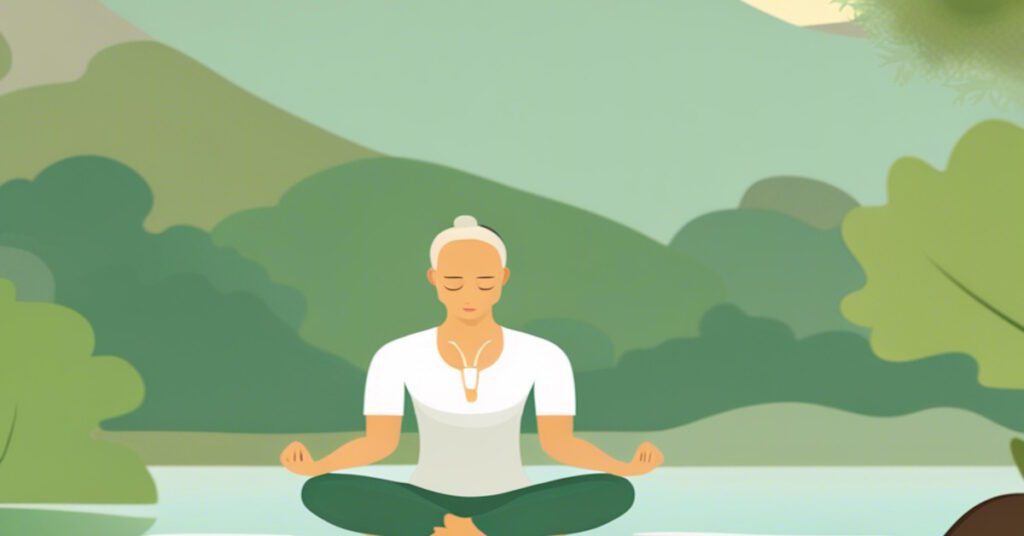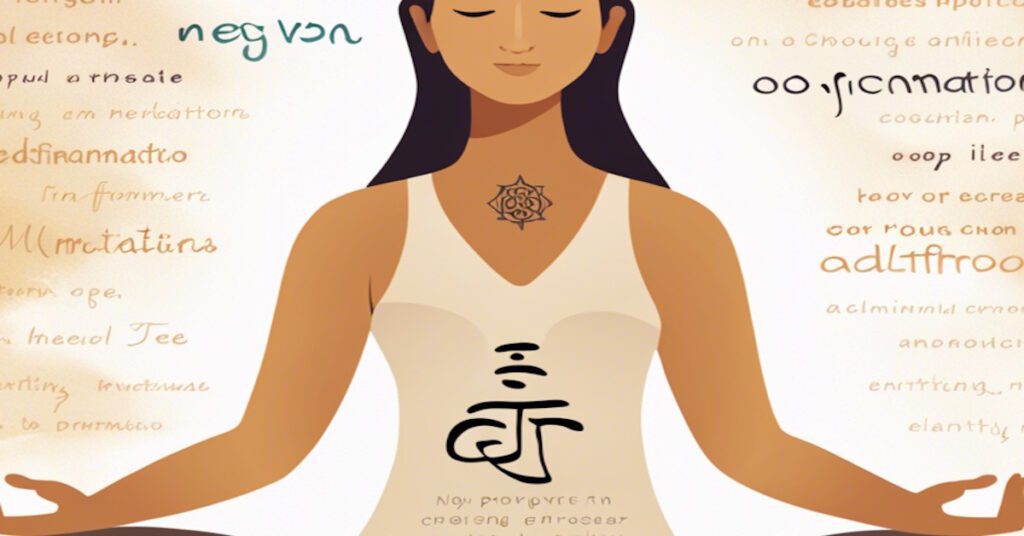Feeling overwhelmed in this whirlwind of a world, with every beep, buzz, and notification demanding our attention? Take a deep breath, and let’s chat about meditation health benefits. You see, this age-old practice isn’t just a trendy buzzword; it’s a haven from life’s chaos. Diving into meditation offers not just peace but a treasure trove of health perks. Curious? Let’s journey together into the soothing world of meditation and its transformative health benefits.
Well, prepare to be amazed! Multiple studies have shown that regular meditation not only helps reduce stress and improve mental clarity but also has astonishing effects on physical health – from lowering blood pressure and improving cardiovascular health to even slowing down the aging process. So why not give yourself the gift of inner calmness while reaping all these incredible health benefits?
What Is Meditation

Meditation is a practice that has been around for centuries, and with good reason – it’s incredibly beneficial for your health. In this article, we’ll take a look at some of the key benefits of meditation, and we’ll also provide some tips to get you started.
Some of the most important benefits include:
- reduced stress and anxiety
- improved mental clarity and focus
- increased compassion and empathy
- better sleep
- improved cardiovascular health
- reduced symptoms of depression and addiction
- enhanced self-awareness
While you may experience some initial changes when you start meditating, the most significant benefits often take time to appear and require consistent practice.
Focusing the mind on a specific object, thought, or activity is key to achieving a state of inner stillness and tranquility.
💡 key Takeaway: Meditation is a practice that involves training the mind to concentrate and redirect thoughts. It encompasses various techniques, including mindfulness meditation and mantra meditation. The advantages of meditation go beyond relaxation, as it can have a positive impact on mental and emotional well-being.
Types of Meditation

There are different types of meditation that people can practice, such as mindfulness meditation, mantra meditation, loving-kindness meditation, and transcendental meditation.
Each type has its own specific focus and methodology.
Take mindfulness meditation as an example, which involves being fully present in the current moment and accepting it without any form of judgment. On the other hand, mantra meditation utilizes repetitive sounds or phrases to help direct and concentrate the mind.
“Mindfulness meditation is a powerful tool for reducing stress and improving overall well-being.” – John Kabat-Zinn
Meditation comes in different forms, each providing unique methods to achieve mindfulness and relaxation. Here are some commonly practiced types of meditation:
1. Mindfulness Meditation: This type of meditation emphasizes staying present in the moment and being aware of your thoughts, emotions, and bodily sensations without judgment. It involves focusing on your breath or on specific sensations in your body.
2. Loving-Kindness Meditation: Also known as Metta meditation, this practice involves cultivating feelings of compassion and love towards yourself and others. It typically begins with directing loving-kindness towards oneself and then expanding it to loved ones, acquaintances, and even to those we have difficulty with.
3. Transcendental Meditation: This form of meditation involves using a silent mantra, a word or phrase that is repeated in a specific way. The purpose is to transcend ordinary thinking and access a state of deep relaxation and heightened awareness.
4. Guided Visualization: In guided visualization meditation, a narrator or audio recording guides you through a series of vivid mental images to help you relax and imagine positive outcomes. It often involves imagining yourself in a peaceful, serene environment or visualizing specific goals.
5. Movement-Based Meditation: Examples include yoga, tai chi, and qigong. These practices combine physical movements, breathwork, and mindfulness to achieve a state of relaxation and focus.
6. Body Scan Meditation: This meditation technique involves systematically scanning your body from head to toe, bringing awareness to each body part and noticing any sensations, tension, or discomfort. It helps to promote relaxation and release physical tension.
💡 key Takeaway: Meditation comes in various forms, such as mindfulness meditation, loving-kindness meditation, transcendental meditation, guided visualization, movement-based meditation, and body scan meditation. Each type provides a distinct method for attaining mindfulness and promoting relaxation.
How Does Meditation Work?

Meditation isn’t just the latest buzzword or a fleeting trend. It’s a timeless practice that’s been around for ages, deeply rooted in the traditions of numerous cultures. But have you ever paused and wondered, “How does this calming ritual actually affect us?” Let’s journey together into the intriguing science behind meditation.
Imagine our brain as a radio, constantly tuning into different stations. When we’re bustling about, it’s mostly tuned into the ‘beta wave’ station, which is pretty upbeat and lively. Meditation, however, gently adjusts that dial, tuning us into the more soothing ‘alpha’ or even the dreamy ‘theta’ wave stations. This transition invites a feeling of serenity and deep relaxation to wash over our entire being.
Now, here comes a delightful twist! The magic of meditation doesn’t just stop at tinkering with our brainwaves. Dive deeper into scientific findings, and you’ll discover that consistent meditation can genuinely transform the landscape of our brains. Incredible, right?
Meditation seems to be like a gentle sculptor, molding and enhancing areas of our brain linked to focus, handling our emotions, and retaining memories. And the results? Those who embrace meditation have brains that are tangibly different – in a good way – compared to those who haven’t discovered this practice yet. This goes to show that meditation doesn’t just offer us fleeting moments of peace but paves the way for long-lasting wellness and happiness.
But the wonders of meditation don’t end with our brains. Our entire body seems to sigh in relief when we meditate. It’s like giving ourselves a mini-vacation, dialing down stress hormones, taking the weight off our hearts (literally by reducing the heart rate), and offering a soothing drop in blood pressure. And guess what? The gifts keep pouring in!
Research has hinted at how consistent meditation might be like a secret potion for our immune system, rejuvenating it and even playing a role in how our cells age. So, the next time you sit down for a quiet moment of reflection, know that there’s a world of wonder unfolding within you, thanks to the enchanting power of meditation.
Physiological Effects of Meditation: Let’s Decode the Inner Harmony

Ever pondered what happens under the skin when you’re lost in a peaceful meditation session? Well, it’s like your body is tuning into its favorite feel-good song, harmonizing each note for a healthier you. Let’s delve into the incredible symphony that unfolds within you when you meditate.
1. Gentler Heartbeats, Healthier Life:
Every time you meditate, imagine your heart sighing in relief. Research sings praises of how meditation can mellow down that over-enthusiastic blood pressure. This isn’t just a calming lullaby for your heart but a warrior tune warding off worrisome heart diseases and strokes.
2. A Calmer Heart’s Rhythm:
As you float in meditation, your heart seems to waltz to a slower, more graceful beat. This serene dance not only chases away stress and unease but also extends an invite to better cardiovascular wellness.
3. Supercharging Your Immune Guards:
Meditation is like a pep talk for your immune system’s brave soldiers, especially the valiant natural killer cells. They emerge stronger and more determined, ready to shield you from those pesky viruses and intruding bacteria.
4. Breathing Deeper, Living Healthier:
Ever noticed how, during meditation, each breath feels like a rejuvenating ocean wave? These deep inhalations and exhalations work wonders, treating your lungs to a spa day and filling your blood with a fresh gust of oxygen. Especially for those with breathing challenges like asthma, it’s like nature’s gentle therapeutic whisper.
5. Toning Down the Internal Fires:
Our bodies sometimes overreact, sparking internal fires or inflammations. These can lead to health hiccups like heart troubles, diabetes, and more. Think of meditation as a soothing rain, dousing these fires and nudging your body towards tranquility and health.
6. Harmonizing Your Inner Chemical Symphony:
Stress feels like that off-key note that throws the entire orchestra into chaos. Meditation, however, has the magical touch to balance out those unruly hormones, especially the notorious stress maestro, cortisol. And with less cortisol crashing the party, your body can finally enjoy its harmonious symphony of health.
So, the next time you’re immersed in meditation, know that it’s not just your mind but your entire body that’s singing a song of health, gratitude, and well-being.
💡 key Takeaway: Regular meditation practice can have a profound impact on your body’s physiological functioning, including reducing blood pressure, decreasing heart rate, enhancing immune system function, improving respiratory health, decreasing inflammation, and balancing hormone levels.
Benefits of Meditation: Finding Magic in the Mindful Moments

Ever felt like you just needed a breather from the whirlwind of life? Enter meditation, that cozy, heartwarming chat with your inner self. If life’s a bustling market, meditation is that quaint little café in the corner where everything seems peaceful. Let’s unravel the beautiful tapestry of wonders meditation weaves into our lives.
- A Shelter from the Storm of Stress:
Life’s storms often ruffle our feathers. But meditation? It’s like that cozy umbrella shielding us from rain. Every time you meditate, picture stress as this cloud that’s slowly drifting away. By dialing down the noisy drama of stress hormones like cortisol, meditation whispers tranquility to our souls, helping us dance through life’s hiccups with grace. - Sharpening Your Inner Genius:
Imagine your mind as a blade. With all of life’s chaos, it could get a bit dull. Meditation is that whetstone, honing your focus and sharpening your concentration. With this refined mental blade, you’re more prepared to slice through tasks, make snappier decisions, and shine brilliantly in everything you do. - Dreaming Under Starry Nights:
Those nights when sleep feels like a distant lover? Meditation is the bridge reconnecting you. Like a lullaby, it calms those restless thoughts, tucking you into a warm embrace of peaceful slumber. So, the next time sleep plays hard to get, let meditation be your serenade. - A Mirror to Your Soul:
Ever wished for a map to your inner cosmos? Meditation lays it out. It’s like having heartfelt chats with your soul, helping you decode the language of your thoughts and feelings. And as you get more in tune with these inner rhythms, you not only spot those sneaky habits that might trip you up, but you also discover a world of self-love and acceptance.
So, let’s take a moment. Breathe. Close your eyes, and let’s dive into the wondrous journey meditation gifts us. After all, in these silent whispers with ourselves, we find the loudest joys.
💡 key Takeaway: Regular meditation practice can help reduce stress, improve focus, enhance sleep quality, and foster self-awareness.
How to Start Meditating

Find a Comfortable Place
Creating a peaceful and comfortable space is essential for a successful meditation practice. Here are some tips to help you find the ideal environment:
1. Choose a Quiet Space: Find a room or area in your home where you can minimize distractions. Ideally, this should be a space where you can be alone and away from noise and interruptions.
2. Create a Calming Atmosphere: Set the mood by dimming the lights and adding soft, soothing music or nature sounds. Consider using essential oils or candles to create a relaxing aroma.
3. Use Comfortable Seating: Ensure your seating arrangement allows you to maintain an upright and relaxed posture. You can choose a cushion or meditation pillow if sitting on the floor suits you, or use a comfortable chair if that is more preferable. The key is to find a position that allows you to remain comfortable and focused without straining your body.
4. Remove Clutter: Clear the space of any unnecessary clutter or objects that may distract you during your meditation. A clean and tidy environment can help promote a sense of calm and tranquility.
5. Add Personal Touches: Consider adding elements that bring you joy or inspire you, such as a favorite plant, a meaningful object, or a picture that holds special significance. These personal touches can enhance the overall ambiance and make the space feel more inviting.
Remember, finding a comfortable place for meditation is subjective, and what works for one person may not work for another. Experiment with different environments and adjust according to your needs and preferences.
💡 key Takeaway: Creating a peaceful and comfortable space for meditation is crucial to enhance your practice and allow for deeper relaxation and focus.
Choose a Time

Finding the right time to meditate is crucial for establishing a consistent practice. Consider these tips when choosing a time to meditate:
1. Morning: Many people find that starting their day with meditation sets a positive tone for the rest of the day. It can help you feel centered and focused, and provide a calm start to your morning routine.
2. Evening: Meditating before bed can be an effective way to wind down and relax your mind and body. It can help release tension and promote a good night’s sleep.
3. Lunch Break: If you find it challenging to carve out time in the morning or evening, consider using your lunch break as an opportunity for meditation. Taking a few minutes to step away from work and focus on your breath can help reduce stress and recharge your energy for the afternoon.
As you experiment with different times, pay attention to when you feel most alert, calm, and receptive to the practice of meditation. Each person has their own unique preferences and rhythms, so find the time that works best for you.
Key takeaway: Finding the right time to meditate is essential for establishing a consistent practice. Consider options such as morning, evening, or even during your lunch break, and choose the time that allows you to feel most alert and receptive to the practice.
Start with a Breathing Exercise

One of the fundamental techniques to begin your meditation practice is to start with a breathing exercise. Focusing on your breath helps to calm the mind and bring your attention to the present moment.
To start, find a quiet and comfortable place where you won’t be disturbed. Sit in a relaxed position, either cross-legged on the floor or in a chair with your feet flat on the ground. Close your eyes or softly gaze down in front of you.
Take a deep breath in through your nose, filling your belly with air. Allow your breath to expand your chest and diaphragm. Then, slowly exhale through your mouth, releasing any tension or stress.
Continue this deep, slow breathing pattern, focusing on the sensation of the breath entering and leaving your body. Pay attention to the rise and fall of your abdomen and the sensation of the air passing through your nostrils.

You may notice thoughts or distractions arise, but gently bring your attention back to your breath each time. It’s normal for the mind to wander, but the practice is in bringing it back to the present moment.
As you continue this breathing exercise, you’ll begin to feel a sense of relaxation and inner peace. This technique helps to calm the nervous system, reduce anxiety, and promote a state of deep relaxation.
So, take a few moments each day to incorporate a breathing exercise into your meditation routine. It’s a simple yet powerful practice that can help you establish a foundation for your meditation journey.
💡 key Takeaway: Starting your meditation practice with a breathing exercise can help calm the mind, reduce anxiety, and promote relaxation.
Pick a Mantra or Affirmation

Choosing a mantra or affirmation can enhance your meditation practice by providing a focal point for your attention. A mantra is a word or phrase that you repeat silently or out loud during meditation, while an affirmation is a positive statement that you affirm to yourself. Both can help center your mind and promote a sense of calm and clarity.
When selecting a mantra or affirmation, it’s important to choose something that resonates with you personally. It could be a word or phrase that holds significance, such as “peace,” “love,” or “I am calm and at ease.” Alternatively, you can create your own mantra or affirmation that reflects your goals or aspirations. Consider statements like “I am worthy of happiness and inner peace” or “I release tension and find serenity within.”
To make the most of your chosen mantra or affirmation, follow these steps:
1. Find a quiet and comfortable place where you can meditate without distractions.
2. Set aside a specific time each day to practice meditation and stick to it consistently.
3. Start your meditation session with a few deep breaths to relax your body and focus your mind.
4. Begin repeating your chosen mantra or affirmation either silently or out loud.
5. Allow your attention to rest on the words, without judgment or analysis. If your mind wanders, gently bring it back to the mantra or affirmation.
6. Continue this practice for a designated duration, such as 5 or 10 minutes, gradually increasing the time as you become more comfortable.

Remember, the purpose of meditation is not to empty your mind of thoughts, but rather to observe them without attachment and cultivate a sense of inner peace and presence. By incorporating a mantra or affirmation into your meditation practice, you can deepen your experience and tap into the transformative power of focused intention.
💡 key Takeaway: Choosing a mantra or affirmation can enhance your meditation practice by providing a focal point for attention, promoting calm and clarity. Incorporating a mantra or affirmation into your meditation routine can deepen your experience and tap into the transformative power of focused intention.
Meditation Health Benefits for Mind and Body
Meditation has been practiced for centuries for a variety of reasons, but what are the health benefits?
There are many health benefits to meditation, but here are a few of the most common:
2. Reduced stress levels
3. Reduced anxiety
4. Reduced depression
5. Reduction in blood pressure
6. Reduction in heart rate
7. Increased focus and concentration
8. Increased sense of well-being
9. Alleviation of pain
10. Increased lifespan









